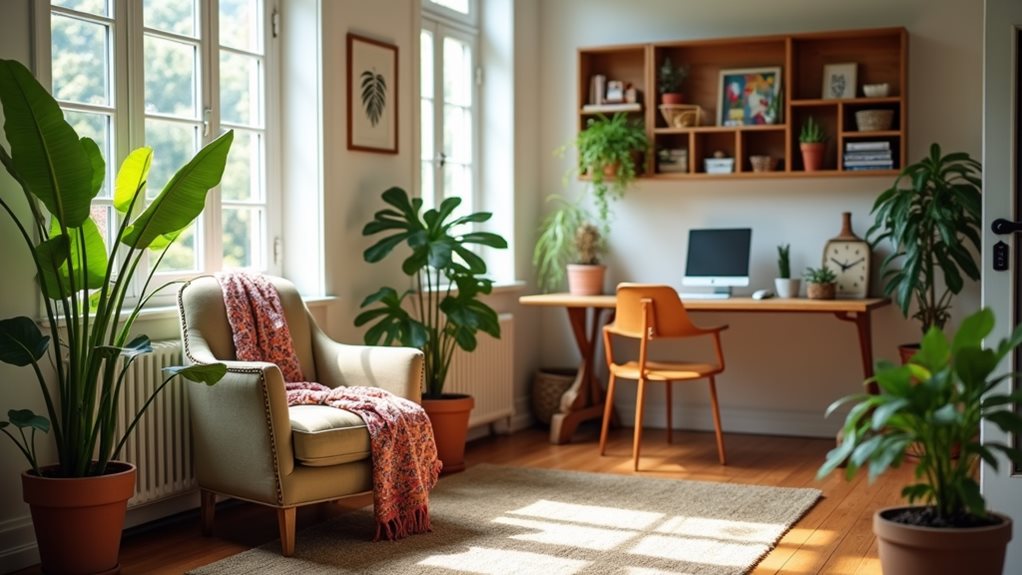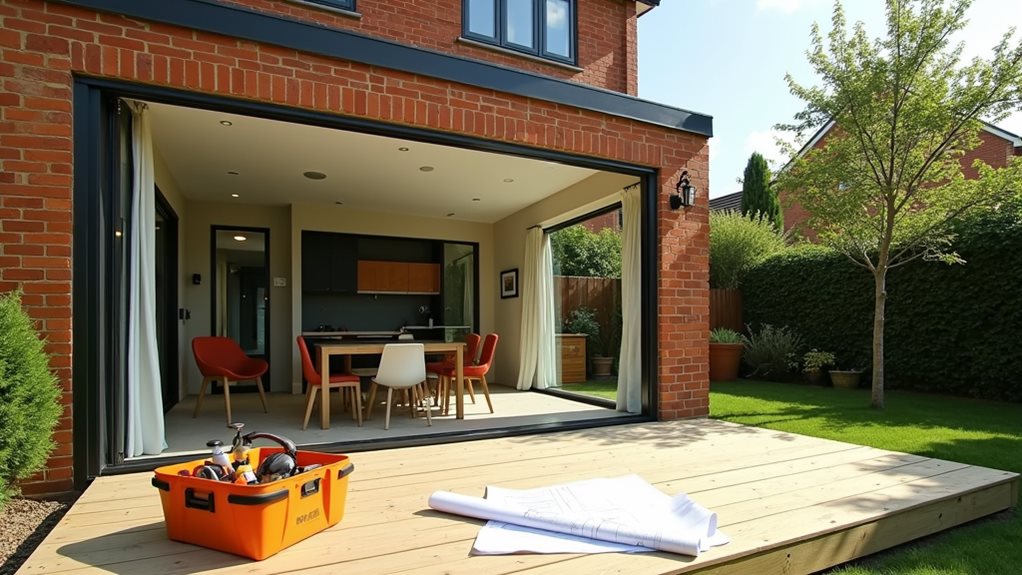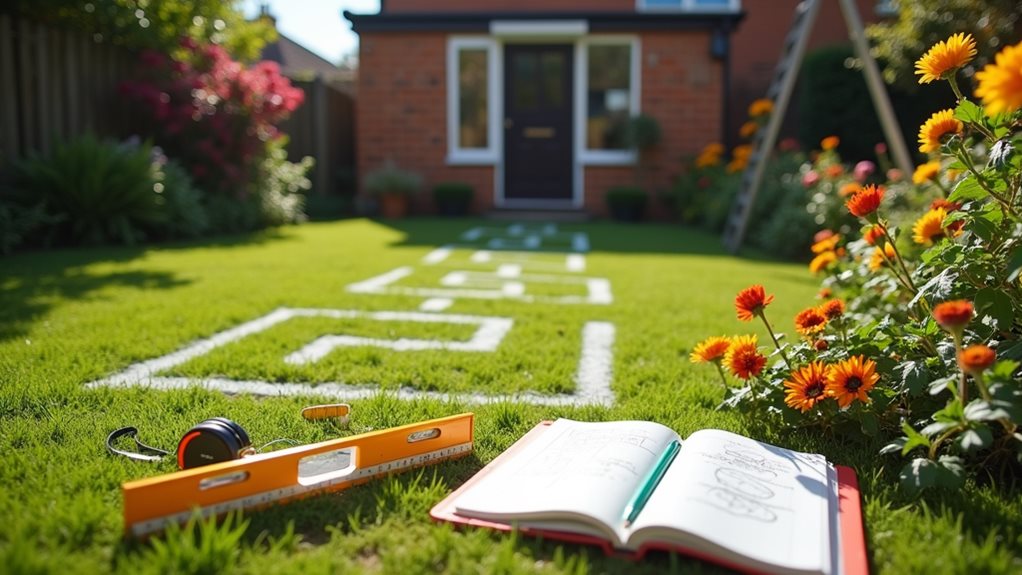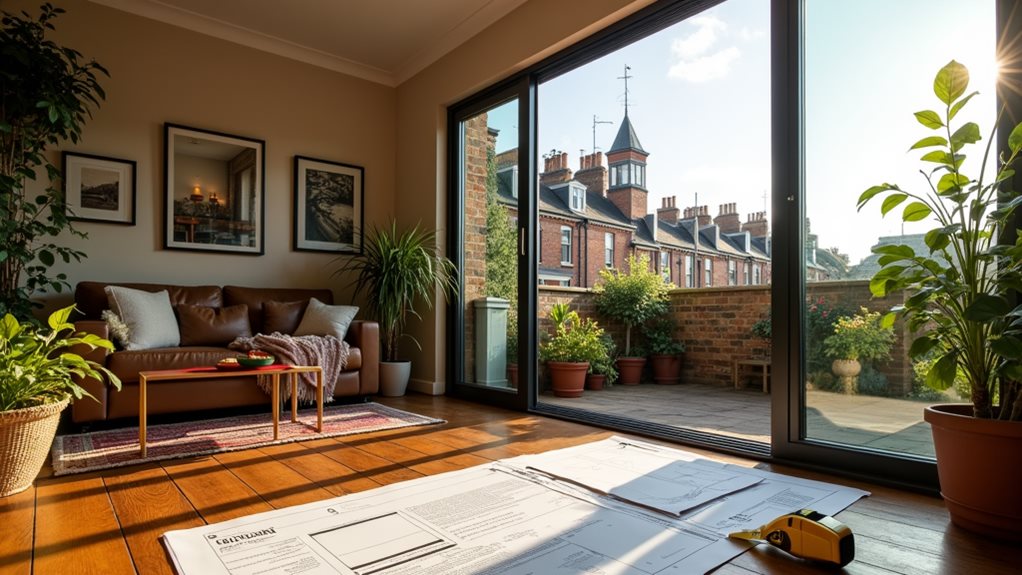Phone:
(701)814-6992
Physical address:
6296 Donnelly Plaza
Ratkeville, Bahamas.

Planning a budget-friendly extension in Manchester requires savvy choices—discover essential tips and strategies to maximize your investment.
If you're considering budget-friendly extensions in Manchester, start by understanding the costs involved. Plan for construction expenses, planning fees, and contractor costs while setting aside a contingency fund. Focus on affordable design options like open-plan layouts and cost-effective materials; these not only save money but also enhance functionality. Don't forget to navigate the planning permission process smoothly and choose qualified contractors for reliable outcomes. Prioritize essential elements to stay within budget and create a space that suits your needs. Stick around for more tips on ensuring your extension project comes in under budget while meeting all your expectations.

When considering a home extension, understanding the costs involved is essential to avoid financial pitfalls. You might be excited about the extra space, but getting a proper extension cost breakdown helps set realistic expectations.
Typically, bedroom extensions in Manchester range from £16,000 to £70,000 for single-storey options and up to £100,000 for two-storey designs. In addition, the cost of extensions often varies based on size and design complexity, which can significantly impact your overall budget. Builders' expertise in house extensions can also help maximize your investment.
For those thinking about side or rear extensions, sizes play a significant role in determining costs. A small 30m² extension could set you back around £45,000 to £100,000, while a larger 60m² extension might climb dramatically to £180,000.
Also, don't forget about fitted kitchens or bathrooms, which can add another £5,000 to £30,000 to your budget.
Other costs, such as planning permission (about £180 to £250) or architect fees (around 8% of the total cost), can sneak up on you. It's crucial to factor these aspects into your overall budget.
Understanding the factors that influence extension costs is crucial for anyone starting on a home renovation journey. Your project's final price tag can shift based on several key elements, so it's important to be aware of them.
Here are four influencing factors to take into account:

Steering the budgeting process for your home extension can feel overwhelming, but breaking it down into manageable parts makes it easier. Start by determining your total budget; aligning your expectations with reality is vital. Set aside 10% for fees and permissions, including professional services like architects and planners.
Remember to budget 40-50% for construction costs, which cover everything from foundations to roofing. Next, factor in the fit and finish costs, allocating 20-30% for elements like flooring and kitchens.
It's smart to reserve a contingency fund of 10% for unexpected expenses that may arise during construction. Don't forget about landscaping, which, while often overlooked, can enhance your space considerably post-build.
Incorporating budget tracking is essential for effective expense management throughout this process. Regularly review your spending against your budget to stay on course.
Embrace the journey; this process is about enhancing your home and creating a space that feels like yours. With careful planning and keen attention to detail, you'll find budgeting for your extension can lead to a rewarding outcome that adds value to both your home and your lifestyle.
Exploring affordable design options can help maximize both your budget and vision for your home extension.
With the right choices, you can achieve affordable aesthetics and design versatility, turning your ideas into reality without breaking the bank.
Here are four key strategies to contemplate:
1. Material Selection: Opt for cost-effective materials like timber or recycled options that not only fit your budget but also reduce environmental impact.
2. Layout Efficiency: Embrace open-plan designs that create spaciousness and warmth, allowing natural light to flow throughout.
Multi-functional furniture can enhance usability while saving space.
3. Energy Efficiency: Incorporate energy-saving features such as excellent insulation and double glazing.
This choice not only cuts down on energy costs but also adds comfort to your living environment.
4. Design Simplicity: Keep it straightforward.
A simple, square-shaped extension minimizes complexity, making it easier to manage costs.
Standard sizes for doors and windows can further streamline construction.

When considering your budget-friendly extension, it's vital to navigate the planning permission process in Manchester efficiently. The first step is to determine whether your project requires a planning application, especially for major alterations or new builds. Understanding the specific requirements can save you time and reduce headaches down the road.
Once you've gathered the necessary documents, submit your application, and expect a validation period of 1-2 weeks. Make sure everything is complete, as incomplete applications may be returned, adding unnecessary delays.
Following validation, you'll enter the public consultation phase lasting about 3-4 weeks, where neighbors and stakeholders can provide valuable community feedback. Their insights might seem overwhelming, but they can strengthen your project by building local support.
After the public consultation, the local planning authority will assess your application based on planning policies and the community's input, typically taking 8-13 weeks. It's important to stay engaged throughout this process.
When you're ready to expand your space, finding the right contractor is essential for a smooth process.
Start by researching local professionals who've proven expertise, as their experience can make a significant difference in your project's success.
Once you've gathered several quotes, don't just look at price—consider the services offered and the contractor's track record to guarantee you're making a smart choice.
Finding the right contractor for your budget-friendly extension can feel overwhelming, but knowing where to start makes a world of difference.
Here's a handy guide to help you navigate the process smoothly.
1. Identify Contractors: Use local directories and online platforms to find potential candidates in Manchester.
Lean on trusted sources like friends or family for referrals.
2. Assess Licenses and Certifications: Always verify that your top picks are licensed and insured, meeting all local legal requirements.
This step protects you from potential liabilities.
3. Compare Estimates: Get detailed written estimates from at least three contractors.
Make sure they outline materials, project timelines, and costs.
If an estimate seems unusually high or low, dig deeper.
4. Evaluate Reputation and Reviews: Check out past work and references.
Look for contractors with at least five years of experience and read online reviews, enhancing your understanding of their reliability.
Expertise in construction isn't just a luxury; it's a necessity when choosing the right contractor for your budget-friendly extension. Evaluating contractor qualifications starts with examining their project portfolios.
Look for a diverse range of completed projects, particularly those similar to what you envision. This not only showcases their capabilities but also gives you insight into their project scalability. You'll want to see how well they adapt to varying project sizes and complexities.
Don't overlook client reviews and testimonials—they provide a glimpse into the contractor's reliability and customer satisfaction.
Additionally, check for professional certifications and ongoing training—these are indicators of their commitment to maintaining high standards. A contractor's industry reputation can make or break your experience, so gather information from online reviews and verify references to guarantee you're in good hands.
Comparing quotes and services from various contractors is essential to ensuring you get the best value for your budget-friendly extension. A thorough quote comparison helps you make informed decisions, so take the time to evaluate each proposal carefully.
Here are four key steps to guide your service evaluation:

When you're setting out to budget for your extension project, start by establishing a firm budget that you can realistically stick to.
Prioritize essential features that align with your needs, ensuring your money goes toward what truly matters.
Finally, look for cost-effective materials that offer durability and style without breaking the bank, allowing you to achieve your goals without overspending.
Setting a firm budget is essential for a successful extension project, and it's imperative to get it right from the start. By clearly understanding your budget constraints, you'll lay a solid foundation for financial planning throughout the process.
Here are some practical steps to help you set a realistic budget:
After establishing a firm budget, the next step is to prioritize features that truly matter for your extension. By focusing on essential features that serve a functional purpose, you're setting your project up for success without breaking the bank.
Start by identifying must-have elements that cater to daily needs, such as a spacious kitchen or an updated bathroom, rather than less frequently used spaces like guest bedrooms.
Investing in high-quality materials guarantees that these areas not only function well but also add value to your home. Consider opting for off-the-shelf products which can help minimize costs while maximizing efficiency.
To streamline your design, limit complex architectural features that could inflate expenses and complicate the build.
Think ahead about your future needs; planning for versatility means you can create flexible spaces that adapt to changing circumstances.
Also, keep an eye on the elements that enhance energy efficiency, ultimately saving you money while increasing comfort.
To keep your extension project within budget, choosing cost-effective materials is essential. By incorporating sustainable materials and innovative techniques, you not only save money but also make a positive impact on the environment.
Here are some ideas to ponder:
These materials can greatly enhance your extension's functionality and aesthetic while keeping costs manageable.
Remember, opting for innovative techniques can elevate your project's sustainability factor, creating a space that reflects your values and commitment to the environment.
With these tips, you're well on your way to a budget-friendly yet impressive extension!
As you initiate your home extension journey in Manchester, think of it like planting a seed. With careful planning and budgeting, that seed can flourish into a beautiful space tailored to your needs. Just remember, each step—from gathering design ideas to selecting the right contractor—plays an essential role in nurturing your vision. Stay true to your budget, and soon enough, you'll have a vibrant extension that enhances your home's value and your lifestyle.